We saw him the first night. Kurtis sat with his bow. The bear stood motionless in the alders. Quarters like tree stumps anchored him to this steep side of the mountain. His rough coat cut a saw-blade silhouette in the dying light. He had no neck and stubs where ears should be. He looked up the mountain, then down at us.
We froze in our camp chairs, hidden, we hoped, behind a brush pile stacked by Rocky and Old Man Romans. The bear stepped forward, slowly weighting a broad front paw as if to feel the ground, to snap no branches and make no sound. The opposite hindquarter came next. It seemed to hang in the air, then found the earth in silence. The bear’s great muzzle worked the wind. Forty yards away, we watched it pump like a heartbeat, coursing the hidden lifeblood of this mountain.
I whispered to Kurtis, “That’s a good bear,” and told him to get ready. The bear was level to us now. He had moved out of the alders and into the spruce. Rocky posted a cracked and dirty hand on the great hemlock we hid under, leaned in, and said, “That’s a good bear.”
Kurtis clipped his release. He stood. The great head of the bear swung toward us. I don’t know if his eyes swelled, pupils dilated, but I imagine they did. Our half-hour window after sunset was closing. Kurtis went to draw, then stopped and looked down at me and Rock tucked motionless into our camp chairs. “Those branches,” Kurtis whispered. A few yards off the bear, between him and us, a lone sapling grew out of the slope, bent like a hooked-up fly rod over our shooting lane, a mess of thin alder tendrils and budding leaves where they shouldn’t be. “I’ll hit those branches,” Kurtis said.
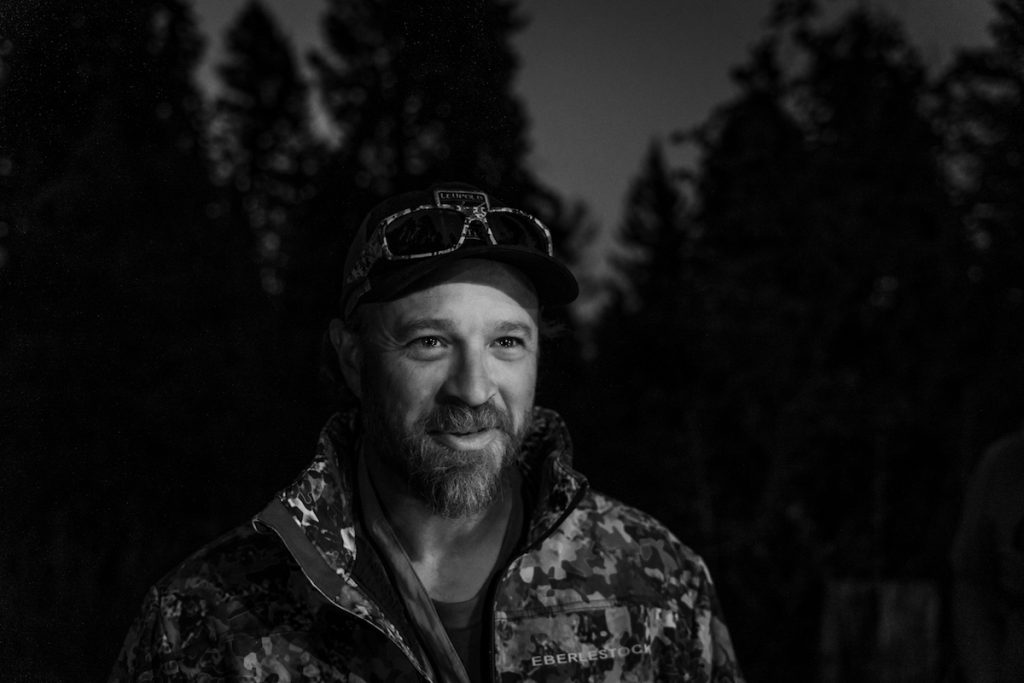
The bear huffed — a deep, low snort that cut blasts of steam in the cold night and us to our spleens. Rocky raised his rifle. In the corner of my eye, the brake made tight, blurry circles in the air, and I was certain that he’d shoot. The bear huffed again and swung its great mass 180 degrees, effortless, lumbering no more. He looked back over his shoulder at us, took one step, and was gone.
The next night, we didn’t see him. Or the following night. Or the night after that.
Years ago, I hunted Idaho with the Romans. Ben and I worked together, and we shot carp on the Snake River, froze them in a chest freezer in stacks like cordwood, then hung them in the trees and buried them on the mountain. Rocky had the sites and hiked in every day to check the fish, restock them, and boil marshmallows and honey on a camp stove. When we checked in those bears with the state to get the seal of Idaho clipped to the hide that marked the kill as legal and right, the wildlife agents always thanked us. There are two ways to control large predators like bears: hunters or the state. One pays for the privilege, the other it costs. Some think, “Let the animals sort it out,” but we pressed our human hand so hard on the balance so long ago and for so long, that to let it go now would mean it all falls apart — a hell for deer, for elk, for native vegetation, for trash cans in the little towns built too close to the mountains, then for the bears themselves.
This year, we didn’t have a lot of time. We split into teams. Me and Kurtis and Rocky. Ben and his dad, Mike, who we all called Old Man Romans, and Tony from the Navy. On the second night, Ben and Old Man Romans, who was built like a bear, and Tony from the Navy — who had never killed a bear — watched a rubbed-out 2-year-old loaf around a small clearing. That night I told Tony that if the week drew on, to take it. He frowned.
“You only get one first bear,” he said.
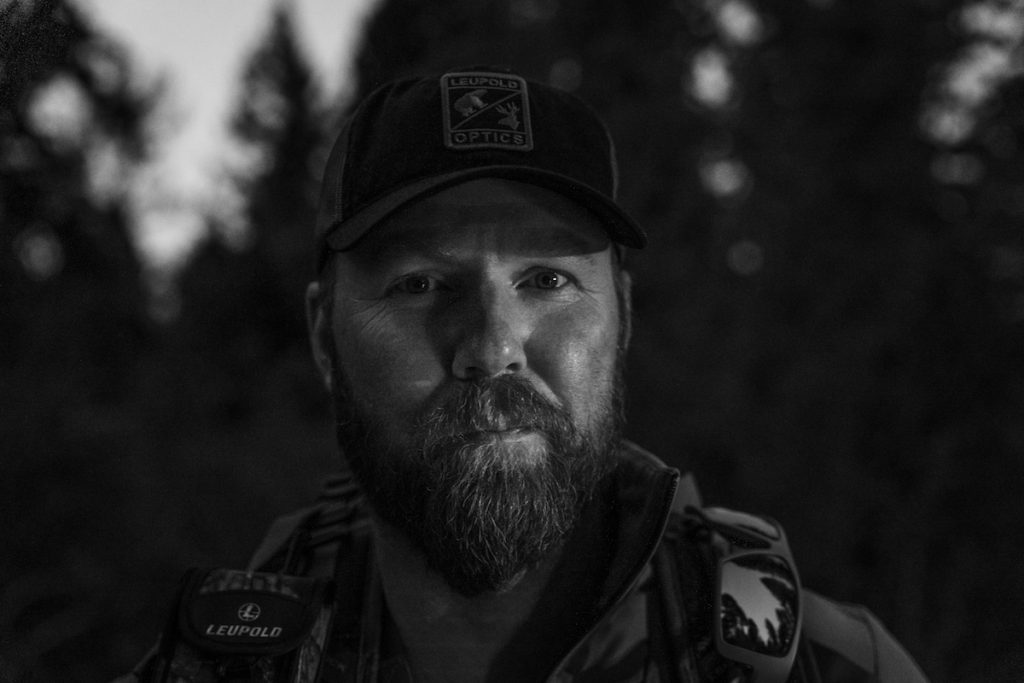
The year we planted carp, I sat with my bow, and one evening we had seven bears come in, one at less than 10 yards, walking a log like a tightrope just out of reach from where we sat. It felt as if I could reach out and scratch him with my arrow. I didn’t kill a bear that year — content to watch them live around us. I told Rocky and Ben I was waiting for a big color-phase, but secretly I hoped he never came so I could keep on watching bears. Tony from the Navy was having these feels, I thought.
Ben and Old Man Romans said when the rubbed-out bear walked out, Tony shook with the fever. All bear hunters must grapple with the fever. We know we have the advantage — speed bows and broadheads, big magnum rifles, .45s or 10 mms on our hips — but when they walk to a few yards, and you gaze in those dark-set eyes that don’t really see, and they huff the air and pop their teeth, superiority isn’t the feeling in your chest. We face in them something in ourselves. The first time I killed a bear, I climbed down the ladder stand and threw up. I know a guy who killed a bear then stepped right out of his treestand like he was stepping out of his truck. He broke an ankle and walked right over to that warm dead bear and shook like the Holy Ghost.
Me and Kurtis and Rocky were on the bears. The second night or the third night, I can’t remember, a pair of young cinnamons hung out with us — oblivious to us — playing grab-ass and competing for marshmallows 30 yards from our set. Kurtis had never killed a bear. The first night the pain in his voice was clear. “Those branches.” When he looked at Rocky and me melted into our camp chairs, I could see a heartbeat in his eyes. Later, I asked him if his blood pressure went up. All he said was “Dude …”
The morning after that close call, we shot bows at Old Man Romans’ camp. Kurtis’ broadheads hit a foot left. I worked on his bow. Rocky worked on his bow. It was an old rig and didn’t take to the work. I told them everything in this world happens for a reason, including branches. Kurtis took Rocky’s rifle. It rested against the hemlock, behind our brush pile, next to Kurtis’ chair as the reckless young cinnamons lazed about. I had blood in my eyes and told Kurtis if he liked either, to take ’em. Rocky waved me off. “They’re no bigger than a golden retriever,” he whispered. I knew he was right. “Take the bears that eat fawns and calves,” he said. Rocky elk-hunts these mountains, too.
We watched the young bears that night, and the night after, and maybe a third night. I can’t remember. That last night with them, the two scraggly bears strung out on the steep of our mountainside and froze. Both bears locked hard on something in the trees. “Get ready,” Rocky whispered. The high bear stomped his foreleg like an angry doe. He stomped again. The low cinnamon turned and walked into the alders. Then back deep in the dark timber, a stick snapped, and the high cinnamon ran off, full trot, crashing through the trees. “Get ready,” Rocky whispered again. Kurtis picked up the rifle.
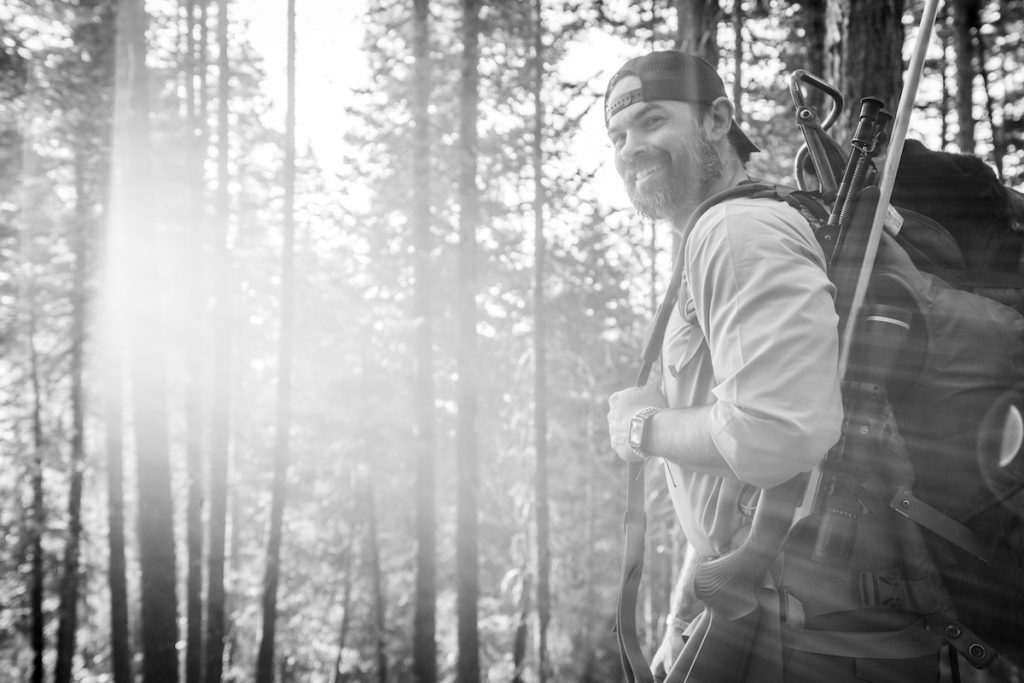
We hung in silence. A clot of dirt and small rocks fell loose at the edge of the high path — at the edge of the visible landscape. A chocolate bear with a pointed face and pointed ears stepped out of the dark. This bear was not afraid. He moved to where the high cinnamon stood and looked around, scratched the earth. “Get ready,” Rocky whispered. Kurtis took a smooth slow knee out of the chair and raised up the rifle. He lowered it and scooted back until he leaned against that massive hemlock. He stepped up his left knee and planted his left elbow. The .300 came up next, steady — a Ranger with his rifle. I plugged my ears and tensed my jaw. Rocky said something now, but I couldn’t hear him. There was only silence, then …
At the shot, the bear jumped and spun his head back, snapping teeth where the lead stung. Kurtis cycled the bolt. The bear leaped down the mountain to run, but when his forelegs hit dirt, they buckled, his life force gone. The bear snowplowed into a tangle of downed branches 15 yards from where Kurtis hit him. “Nice shot,” Rocky said. I gasped — not realizing I had held my breath — and unplugged my ears.
We lashed the young boar to a pack frame, and Kurtis hiked him down the mountain. We skinned off his hide at Old Man Romans’ cabin and cut out his backstraps and hunks of quarters. Everyone was smiles now. There was whiskey. We all turned to Tony now.
“You only get one first bear,” I said. Tony had Ben’s slick new custom rifle with a carbon fiber barrel and carbon stock. We sat 80 yards out from a bait Rocky set. The butt of the gun sat in the dirt, the barrel straight up. Tony had two hands on that carbon tube, leaning in on his camp chair, like an old man weighting a cane, peering forward, trying to see his future. “Better not be rubbed out,” Tony said. This was his last sit with us. Work demanded him the next morning. I badly wanted him to draw blood but respected his choice to wait for the one.
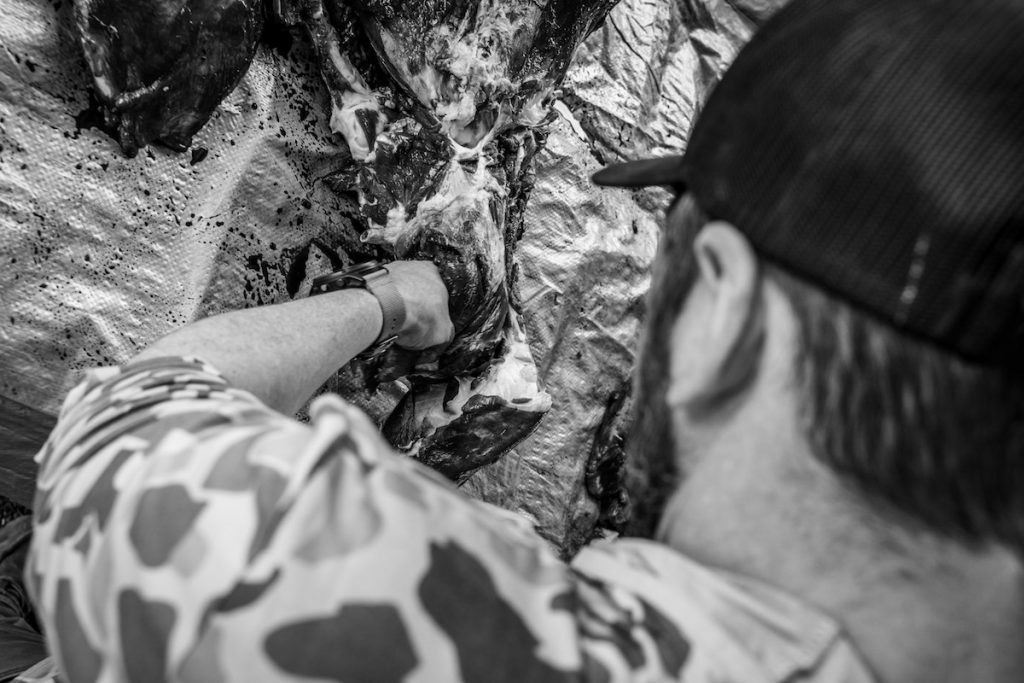
The year we planted carp, Old Man Romans killed a big chocolate that made a magnificent rug. The hide is the prize for bear hunters, the way meat and antlers are for hunters of big ungulates. Some people have funny feelings about eating bears. I’ve never had lousy bear meat. My wife — born and raised in New York City, has never shot a gun, shuns violence of all sorts, tolerates me — will tell you black bear is her favorite meat.
Many years ago, when I lived in the city when we were first married, we’d host huge wild game feeds in our tiny one-bedroom apartment. Friends and friends of friends packed elbow to hip to stay up all night and eat wild food. Most of them, I figure, had never been in a canoe. Duck, geese, pheasant, squirrel, whitetail, panfish, frog legs, black bear. I’d save away cuts of everything I caught and killed over a year for that party, and my wife and I cooked it all up and fed all our hipster friends. Black bear was everyone’s favorite. We’d sear backstrap like beef steak. Make a roast from the big blocks of red hindquarter meat. Slow cook the massive ribs — “dinosaur ribs,” we called them — and watch our friends in publishing and hospitality fight for them. Some hunters, who’ve killed more bears than me, say it’s possible to get a bad one. My belly says they probably just can’t cook. But who knows. Maybe my next one will be sour. Still, good as the meat is, I wouldn’t kill a small one, or a rubbed-out one, or a less than perfect one just to eat it. A bear must be more than food.
I respected Tony’s choice to wait, and wait he did. We saw nothing.
“Get the bear flu,” I said to Tony that night back at camp.
“I can’t,” he said. “Big day at work. I need to see my wife, too.” They’d been married three months. She was already pregnant.
Me and Old Man Romans got up at 4 a.m. Tony was gone. Ben took Kurtis to the airport early, too, so they were gone. We hiked into a new spot, and in the purple sunrise, I took Old Man Romans’ picture. It was his birthday, 67 years old. Rocky got the bear flu and sent us a text. “Took off work.” Old Man Romans and I saw nothing, hiked out early, and met up with Rocky. We got tacos.
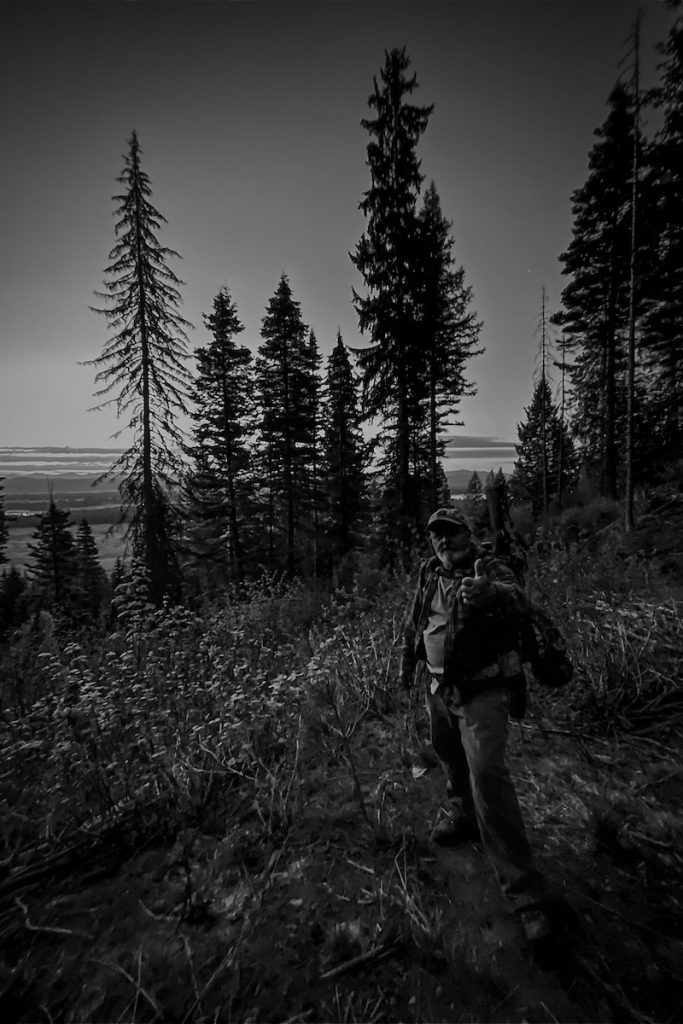
That evening, we hiked back to where Kurtis had killed his bear. We hadn’t seen or heard anything in days. The Great Doubt crept in. Zen Buddhists describe Great Doubt as a ball that grows from the roots of faith and blossoms into the flower of enlightenment. A feeling of uncertainty, a lack of conviction, even fear, pain, and it’s all part of the process. The Zen teacher Yamada Kōun Rōshi said of Great Doubt, “It is like swallowing a red-hot iron ball. You try to vomit it out but can’t.” For hunters, Great Doubt is the iPhone. Certain I’d never see a bear again, I checked out on my phone. I knew it was all over. Then at sunset, the woods seemed to turn, and with it came a thin petal of hope. A doe walked in and blew at us. A raven parked in one of the big spruce trees like a caesar ready for the show. Soon after, a bear.
Eleven minutes before last light on this last sit in our timber hole buried deep in the east side of the mountains, a bear walked out. He knew we were there. It was the giant from our first sit. He took a step, looked, another step, looked. He pointed toward us facing downhill all broad back, big ass, and tiny ears, and I clipped my release and said the bowhunter’s prayer: Turn. Turn. Turn.
Rocky raised his rifle, and the bear looked up. He took a long looping stride left with that heavy right foreleg and opened up a lattice of ribs. I drew and had pins and lungs, and Old Man Romans behind us said, “No shot, No shot,” but I didn’t hear him, and Rocky raised his hand for silence. All hunters must face these questions alone. I had him in the sight, and he walked now back into the brush, all broadside, but that tiny stargate of the peep captured no light on our black side of the mountain.
I let down and spat at Rocky, “Give me that fucking rifle,” in a fit of insanity and rage and with a sense that I was about to fuck this all up. The great bear was in the bushes now, still, a dark silhouette flecked with sunset caught in the leaves of alder. I rose up, rifle out, and touched off Rocky’s .300.
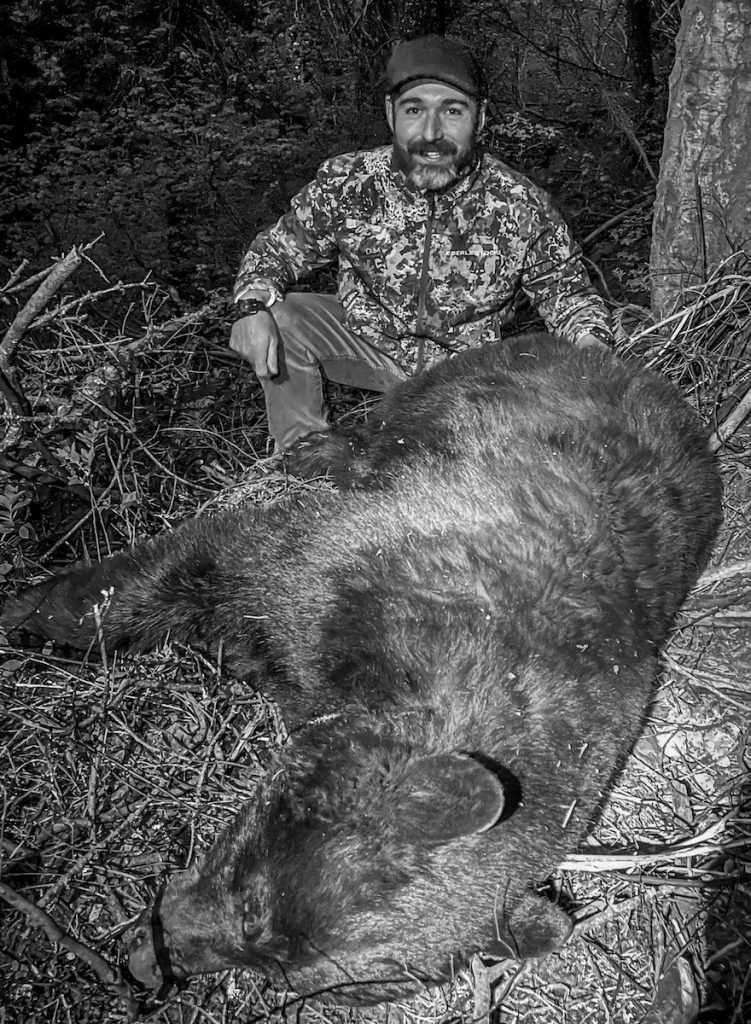
The bullet caught the great bear in the neck and ricocheted from spine crossways down his length, finding his heart and lodging in a perfect deadly mushroom against his inside hide. Like a lightning strike from Zeus or a clap of Thor’s hammer, it was instant and over. There was only a ringing in my left ear and 400 pounds of muscle and claw rolling down the mountain. The light switch shut off without pain or drama or the long, slow moans of winged bears holed up in the timber. If Ursa Major in the sky decides that my time is up, I want to go like that — fast and painless with a hammer to the neck, then nothing.
When it ended, I was shaking. My brain so scrambled that I called Rocky “Henry” — my son’s name. I forgot to take photos till Old Man Romans said we probably should as I walked off the mountain for the sled.
Rocky and I skidded him down, and Old Man Romans and I stayed up until sunrise skinning hide, cutting meat, and dancing to Dolly Parton all wild-eyed and insane, connected to something primordial, something cosmic.
The Great Bear will not be forgotten. He will live on in me and my children, who will eat him and will go to bed at night to the story of his sacrifice, a bonding of blood to blood, one animal to another.
The next morning, I got up early and took a bush plane to Montana.
Read Next: How To Stay Safe in Bear Country

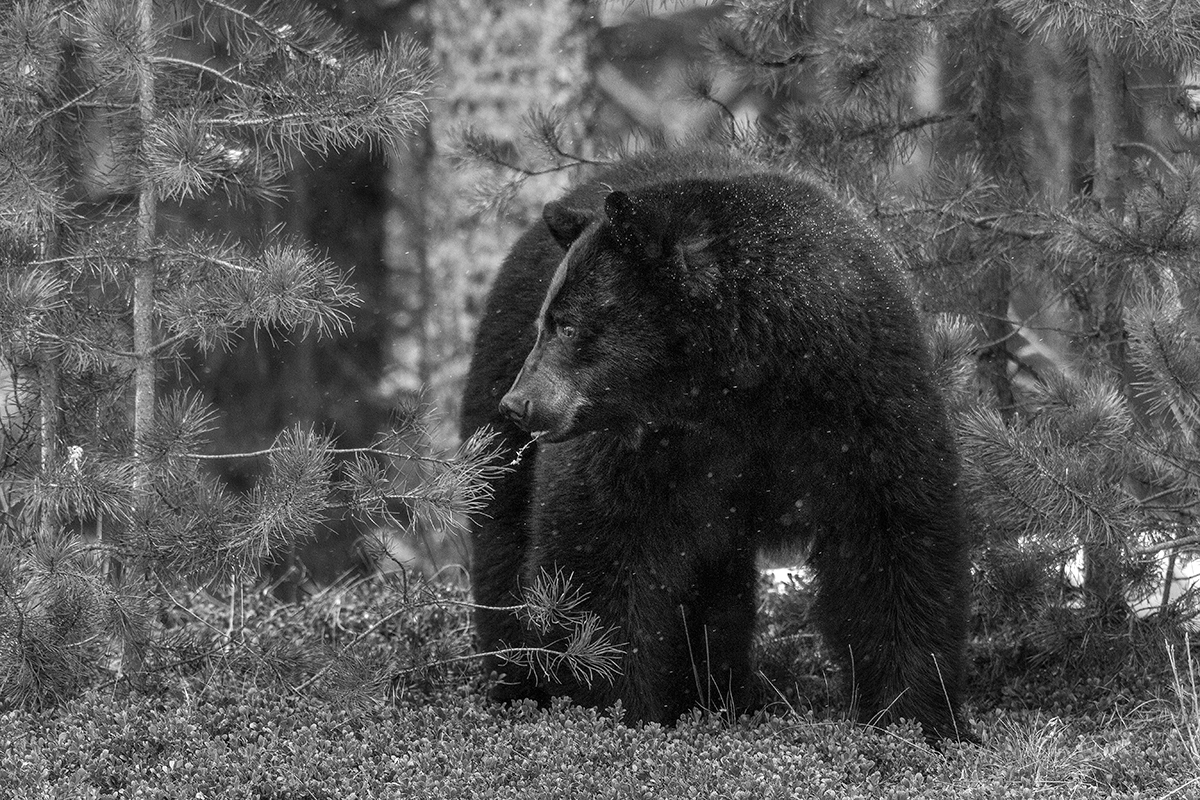
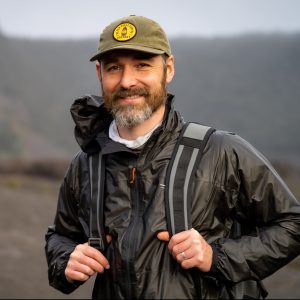
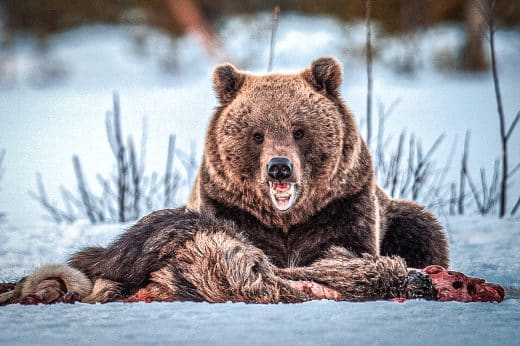
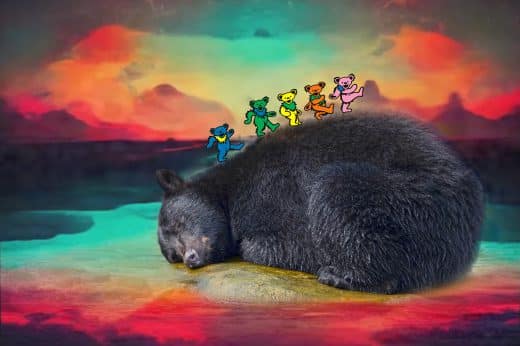
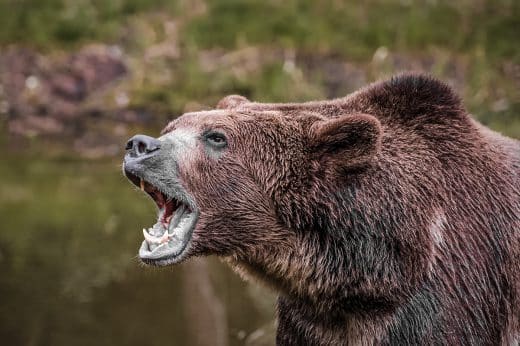


Comments